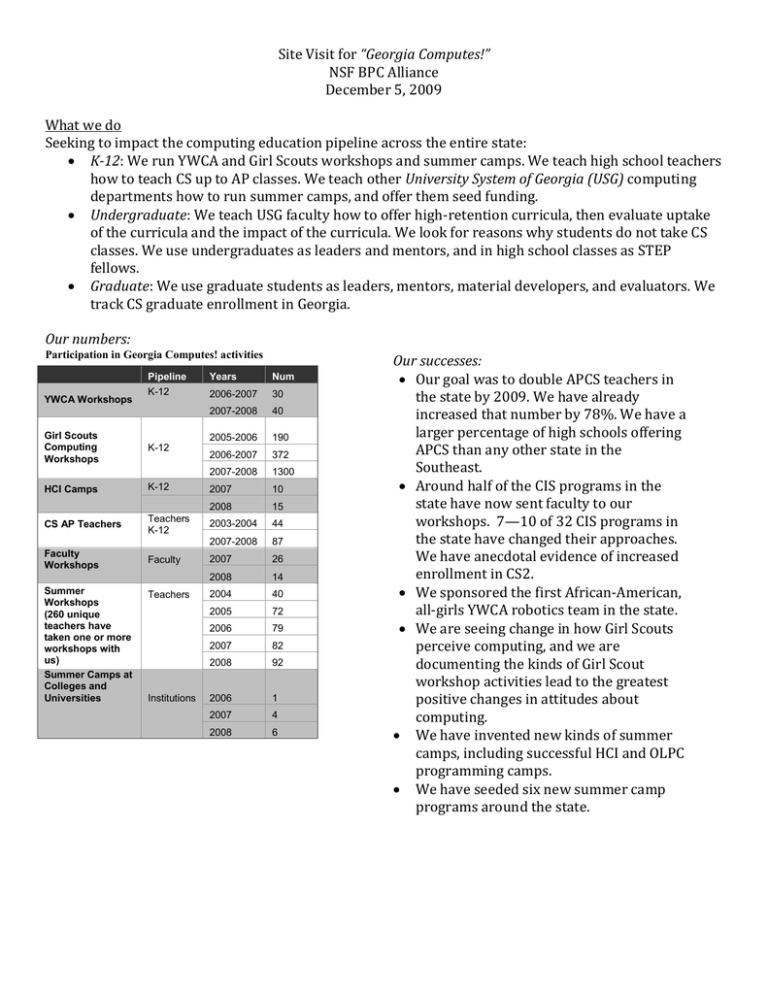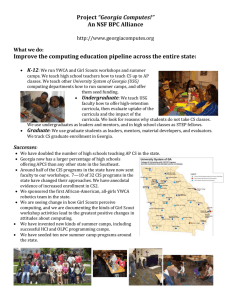Site-Visit-Cover-Page-4Dec2008.doc: uploaded 4 December 2008 at 10:52 am
advertisement

Site Visit for “Georgia Computes!” NSF BPC Alliance December 5, 2009 What we do Seeking to impact the computing education pipeline across the entire state: K-12: We run YWCA and Girl Scouts workshops and summer camps. We teach high school teachers how to teach CS up to AP classes. We teach other University System of Georgia (USG) computing departments how to run summer camps, and offer them seed funding. Undergraduate: We teach USG faculty how to offer high-retention curricula, then evaluate uptake of the curricula and the impact of the curricula. We look for reasons why students do not take CS classes. We use undergraduates as leaders and mentors, and in high school classes as STEP fellows. Graduate: We use graduate students as leaders, mentors, material developers, and evaluators. We track CS graduate enrollment in Georgia. Our numbers: Participation in Georgia Computes! activities YWCA Workshops Girl Scouts Computing Workshops HCI Camps CS AP Teachers Faculty Workshops Summer Workshops (260 unique teachers have taken one or more workshops with us) Summer Camps at Colleges and Universities Pipeline K-12 K-12 K-12 Teachers K-12 Faculty Teachers Institutions Years Num 2006-2007 30 2007-2008 40 2005-2006 190 2006-2007 372 2007-2008 1300 2007 10 2008 15 2003-2004 44 2007-2008 87 2007 26 2008 14 2004 40 2005 72 2006 79 2007 82 2008 92 2006 1 2007 4 2008 6 Our successes: Our goal was to double APCS teachers in the state by 2009. We have already increased that number by 78%. We have a larger percentage of high schools offering APCS than any other state in the Southeast. Around half of the CIS programs in the state have now sent faculty to our workshops. 7—10 of 32 CIS programs in the state have changed their approaches. We have anecdotal evidence of increased enrollment in CS2. We sponsored the first African-American, all-girls YWCA robotics team in the state. We are seeing change in how Girl Scouts perceive computing, and we are documenting the kinds of Girl Scout workshop activities lead to the greatest positive changes in attitudes about computing. We have invented new kinds of summer camps, including successful HCI and OLPC programming camps. We have seeded six new summer camp programs around the state. Our Challenges One of the lessons learned is that a rising tide does not lift all boats equally. While we have had an impact, we have not always had the targeted impact we want. Despite a dramatic increase in APCS teachers and high schools offering APCS, we have seen the same increase as white men in the number of women and members of underrepresented minorities taking the CS AP exam. Our faculty attendance at workshops is not what we had hoped for. We are challenged to get secondary computing teachers trained and in the computing classroom. We regularly get trained teachers who end up not teaching computing, or teachers in computing classes who are inadequately trained. We still have no data for the whole University System of Georgia. We have found that the USG central office does not have the kind of data that we believed. Field work with target users suggests that our online space as originally conceived may not achieve its goals, because students simply won't be interested in it. Others working on similar projects at other institutions have come to the same conclusion (particularly Mary Beth Rosson at Penn State). We have redesigned the online component to focus on teens designing their own online spaces instead of just using anonline space we design. Our evaluation data about our curricula suggest that, while we impact retention, we do not change student attitudes about computing. Student attitudes about computing before classes are pretty much the same after. Our Future Directions What we have done so far is paint with broad strokes, offering workshops to all-comers at the secondary and undergraduate level, tracking whole populations with aggregate numbers, and working with large groups (like YWCA and Girl Scouts). We propose a more targeted approach going forward: Focusing on groups that serve minorities and women, focusing on and tracking specific students of interest, focusing on teachers who need support and training, and focusing on high schools that need special encouragement. We are starting partnerships with Cool Girls, Refugee girls (RRISA), and Boys and Girls Clubs. We are starting the Disciplinary Commons for Computing Education (DCCE), to bring together high school and undergraduate teachers in monthly meetings. Our goals are to improve the teachers’ sense of community, increase communication flow between undergraduate and high school teachers, engage the teachers as researchers, helping with assessment efforts. (CPATH funded.) We are starting a new effort to engage African-American men in computing, by training game players to be game testers. In this way, we leverage their interest in video games to teach them about what’s “under the hood.” (BPC Demonstration Project Funded.) We have just applied for funding (from Google RISE) to start summer camps at high schools where the majority of students are members of minority groups. Explore new contexts for computing that may appeal where our current contexts will not, like social networking. We are starting a new project to engage middle school youth with creating their own social networks. We would like to implement an evaluation based on tracking individuals: o From High School and Middle School Camps o From High School AP programs for our teachers o Into our graduate We are considering the creation of an on-line Masters in Computing Education, to serve high school teachers who want further training and certification, and to serve USG computing faculty who do not have enough graduate credit hours in computing for their programs to become accredited.

